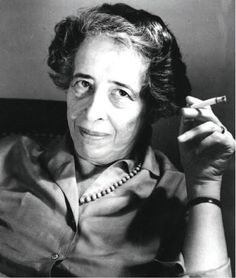As Equation’s Reel Equality Film Club looks forwards to our next screening event of “thinking person’s action movie” Hannah Arendt on 23rd June, we put a spotlight on the famous 20th century thinker with 5 facts that cement her status as an all-round badass icon.
Fact #1 Arendt challenged the Nazis up close. In Germany, Arendt lived a difficult existence under the increasingly discriminatory and violent Nazi regime and was not allowed to teach at university due to her Jewish heritage. Yet she stayed to study anti-Semitism and take part in political resistance activities until she was arrested by the Gestapo in 1933. She narrowly escaped imprisonment and was able to flee the country.
Fact #2 She dared to be a clever woman, in public. Hannah Arendt made thinking her life mission in an era when women were not supposed to think. In mainstream media and culture, clever women remain ‘ugly’ almost by definition and there are few high-profile role models for women who want to enter the public sphere solely on intellectual grounds. Arendt powered over and through this sexism of her (and our) time. She was a fiercely outspoken public intellectual, responsible for some of the most enduring theories in 20th century philosophy, and the first woman to be named a full professor at Princeton University.
Fact #3. Arendt was a wild child. As a precocious young woman at university, she embarked on a teenaged love affair with a married professor twice her age, the eminent philosopher (and future Nazi) Martin Heidegger. She was also a relentless chain-smoker. In fact, when covering the Eichmann trial, creating the reports that were to change the world, she avoided the courtroom and favoured the press room – because they allowed her to smoke there!
Fact #4 Her revolutionary ideas about extremism changed the world’s beliefs about goodies vs baddies. In covering the war crimes trial of Nazi official Adolf Eichmann, who was responsible for deporting Jews to concentration camps, Arendt changed the way the Western world thinks about evil. Her public insight into this key official of the Holocaust was that he was not a monster but an indifferent, mediocre, pen-pushing bureaucrat. This was a shocking revelation. Arendt’s concept of the ‘banality of evil’ continues to remind us that atrocity and genocide is not (necessarily) the product of monstrous, evil baddies, but of “terrifyingly normal” people… people who may be just like us.
Fact #5 Arendt’s outspoken ideas made her a political refugee, social outcast and threatened her life. In Germany her political actions against anti-Semitism made her a target for the secret police. In America, her reporting on the Eichmann trial, which involved suggesting that Jewish leaders during the Holocaust were complicit in facilitating mass deportations to camps, led to ostracism from substantial portions of the Jewish community, including her friends and fellow Jewish thinkers. She also received a large number of death threats.
You can watch a mesmerizing portrayal of Hannah Arendt, the woman with explosive ideas, in our upcoming screening on 23 June at Savoy Cinema, 20:00.
Book now: https://www.eventbrite.co.uk/e/hannah-arendt-reel-equality-film-club-tickets-17188341793

